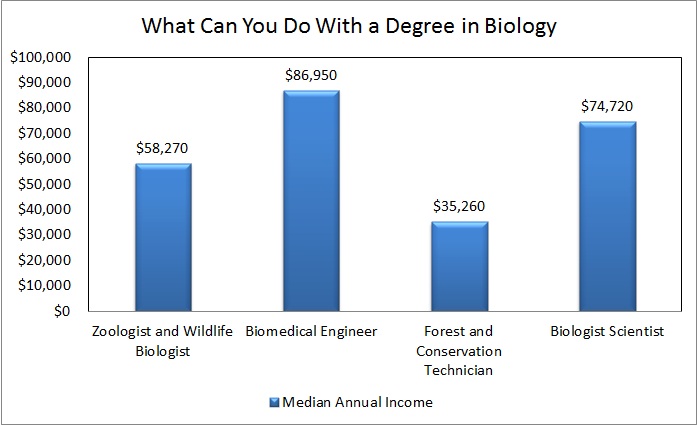What is Biology?
Biology is a natural science which involves the study of living organisms. It includes a study of the structure of living organisms, their function, growth, evolution, taxonomy and ecology. Biology is a very general field and is further divided into different areas like anatomy, bacteriology, ecology, entomology and ornithology among many other fields. Biology has a lot of applied value; and with an increase in health and environment concerns, there is no lack of work for biologists.
Biology degrees are typically available at Associate, Bachelor, Master and doctorate levels. Some institutes may offer specific courses which may be taken to gain college credits or for career advancement.
What are the main courses we will be studying?
An Associate degree is more or less basic and will focus on the area of your interest. A bachelor degree, however, is more exhaustive and also incorporates a study of subjects like mathematics, chemistry and physics. Students in a bachelor degree program in Biology develop many skills that lend to them an analytical thinking pattern which aids them in careers such as research and development. Students are exposed to both theoretical learning in the classrooms and practical learning in laboratories.
A Masters degree in Biology is more research oriented. At the end of the program, students have to prepare a research thesis. Some theses are then published in biology and science journals. Students may also take up a project with the company they are working with and present a thesis report on that. This helps earn them their thesis credits as well as progress professionally at work.
Enrollments of this program

Enrollments % of this program

What are the concentrations or specializations in biology?
Biology is a broader term for a lot of disciplines. You may choose to take General Biology as your major or you could choose one of the many other fields that have branched out from Biology. Some of these fields are:
-
Biotechnology
-
Microbiology
-
Ornithology
-
Genetics
-
Forensic Science
-
Health and Nutrition
-
Botany
-
Marine Biology
-
Ecology
-
Oncology
These fields are very competitive professions in their own right and professionals with these degrees are very highly in demand. Some of these professions may need a license in order for a person to qualify practicing it.
What can you do with this degree?
With a degree in biology, you could work in various private and public institutions. Some of the sectors you could consider working in include: agriculture, agronomy, wildlife service, education, fisheries, forest service, bioinformatics and research. The job you may qualify for will depend on your area of specialization and interest. Here are some popular careers in biology along with the salary data provided by the US Bureau of Labor Statistics – BLS (2014):

-
Zoologist and wildlife biologist
Median annual income: $58,270
-
Biomedical engineer
Median annual income: $86,950
-
Forest and conservation technician
Median annual income: $35,260
-
Biologist scientist
Median annual income: $74,720
What careers can I pursue with a biology degree?
You can pursue a career in any field of biology that you have chosen. Biologists have a highly varied scope. They can work as researchers, journalists, lobbyists, conservationists and teachers. Researchers are doing a lot of work in biology currently. Genetics is a field of biology that has become particularly very popular in the last decade and which has led to groundbreaking innovations in health care. Oncologists are also very highly paid and work on solutions to cure cancer. Conservationists and environmentalists are also in great demand because of the increasing concern about environmental degradation.
Can I Earn an Online Biology Degree?
Yes, many accredited colleges now offer online degrees in biology. For a major part of these degrees, coursework is sent to students who have to study it and complete it before sending it back. Since biology is a subject that requires a lot of practical exposure, many courses have laboratory simulation studies to prepare the students for what lies ahead. Some degrees may also require the candidate to take an internship or some fieldwork to provide the necessary training.